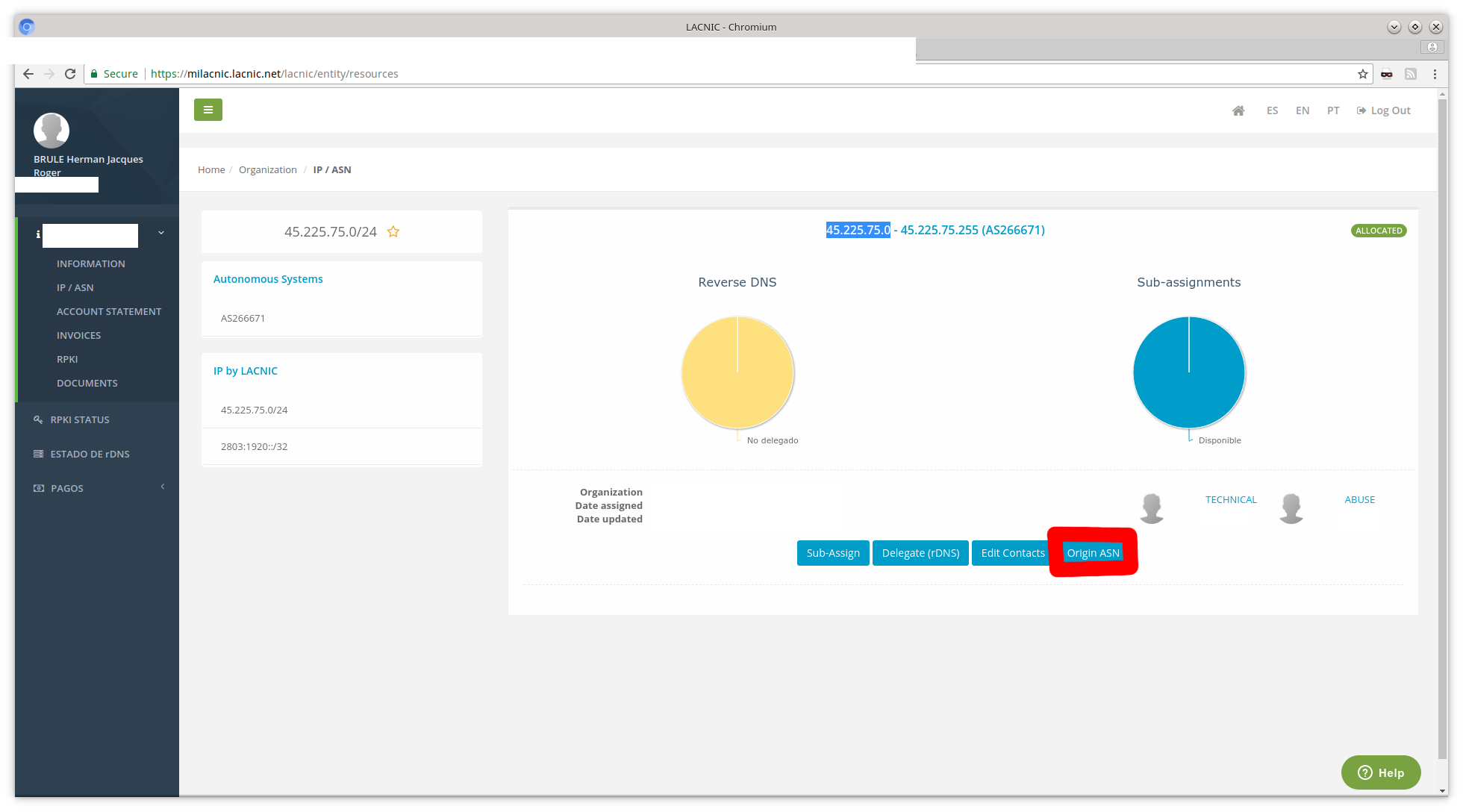You need have public IPv4 for the tunnel type in this howto. One server with BGP session options and talk to oneprovider to enable the option (it's not free, the price is on demand, here +50€/month).
Our ASN for the exemple is ASN 266671, announced route is: 45.225.75.0/24, oneprovider ASN is 9009
Here we use limited MTU to work over PPP (GPON)
PS: 00:22:4d:a4:3b:51 from I receive my trafic (MITAC INTERNATIONAL CORP.)
Please add a route object from your LACNIC account pointing your range to your ASN 266671.
/etc/bird/bird6.conf
router id 37.120.157.227;
protocol bgp ONEPROVIDER
{
local as 266671;
source address 2A0D:5600:X:2;
import none;
export all;
graceful restart on;
multihop 2;
neighbor 2A0D:5600:X::1 as 9009;
}
protocol static
{
route 2803:1920::/32 via 2A0D:5600:X::2;
}
protocol device
{
scan time 5;
}
/etc/bird/bird.conf
router id 185.64.105.21;
protocol bgp ONEPROVIDER
{
local as 266671;
source address 185.64.105.21;
import none;
export all;
graceful restart on;
multihop 2;
neighbor 185.64.105.1 as 9009;
}
protocol static
{
route 45.225.75.0/24 via 185.64.105.21;
}
protocol device
{
scan time 5;
}
should show
bird> show proto all
name proto table state since info
ONEPROVIDER BGP master up 14:14:14 Established
Preference: 100
Input filter: REJECT
Output filter: ACCEPT
Routes: 0 imported, 1 exported, 0 preferred
Route change stats: received rejected filtered ignored accepted
Import updates: 2 0 2 0 0
Import withdraws: 0 0 --- 2 0
Export updates: 1 0 0 --- 1
Export withdraws: 0 --- --- --- 0
BGP state: Established
Neighbor address: 185.64.105.1
Neighbor AS: 9009
Neighbor ID: 91.216.163.254
Neighbor caps: refresh restart-aware AS4
Session: external multihop AS4
Source address: 185.64.105.21
Hold timer: 155/240
Keepalive timer: 52/80
static1 Static master up 14:13:47
Preference: 200
Input filter: ACCEPT
Output filter: REJECT
Routes: 1 imported, 0 exported, 1 preferred
Route change stats: received rejected filtered ignored accepted
Import updates: 1 0 0 0 1
Import withdraws: 0 0 --- 0 0
Export updates: 0 0 0 --- 0
Export withdraws: 0 --- --- --- 0
device1 Device master up 14:13:47
Preference: 240
Input filter: ACCEPT
Output filter: REJECT
Routes: 0 imported, 0 exported, 0 preferred
/etc/quagga/bgpd.conf
! hostname hades password Ddnv6ovqSEwtdiL9q89KKAmV log file /var/log/bgpd.log log stdout ! router bgp 266671 bgp router-id 37.120.157.Z neighbor 37.120.157.Y remote-as 9009 neighbor 2A0D:5600:X::1 remote-as 9009 ! address-family ipv6 network 2803:1920::/32 neighbor 2A0D:5600:X::1 activate exit-address-family address-family ipv4 network 45.225.75.0/24 neighbor 37.120.157.Y activate exit-address-family exit ! line vty !
/etc/network/interfaces
source /etc/network/interfaces.d/*
# The loopback network interface
auto lo
iface lo inet loopback
# The primary network interface
allow-hotplug eth0
iface eth0 inet static
address 185.64.105.21/24
gateway 185.64.105.1
# dns-* options are implemented by the resolvconf package, if installed
dns-nameservers 91.216.163.2 91.216.163.3
dns-search op-net.com
#router gateway
auto eth0:0
iface eth0:0 inet static
address 45.225.75.1
netmask 255.255.255.255
## Ipv6 configuration
iface eth0 inet6 static
address 2a04:2180:0:2::12b
netmask 64
gateway 2a04:2180:0:2::1
dns-nameservers 2a04:2180::101:53 2a04:2180::102:53
Setup the tunnel from oneprovider to confiared
/sbin/modprobe ipip /sbin/ip tu ad confiared mode ipip local 185.64.105.21 remote 190.186.245.10 ttl 64 dev eth0 /sbin/ip ad ad dev confiared 10.0.0.1 peer 45.225.75.2/32 /sbin/ip li se dev confiared up /sbin/ip link set dev confiared mtu 1280 /bin/ping 45.225.75.2 & /sbin/ip ro ad 45.225.75.0/24 via 45.225.75.2
service script
#! /bin/sh ### BEGIN INIT INFO # Provides: uptunnel # Required-Start: $remote_fs $time # Required-Stop: umountnfs $time # X-Stop-After: sendsigs # Default-Start: 2 3 4 5 # Default-Stop: 0 1 6 # Short-Description: up tunnel # Description: up tunnel ## END INIT INFO # # Author: BRULE Herman Jacques Roger <alpha_one_x86@first-world.info> # # PATH should only include /usr/* if it runs after the mountnfs.sh script PATH=/sbin:/usr/sbin:/bin:/usr/bin DESC="up tunnel" NAME=uptunnel uptunnel=uptunnel DAEMON=/root/up-tunnel.sh PIDFILE=/var/run/uptunnel.pid SCRIPTNAME=/etc/init.d/$NAME
# Define LSB log_* functions.
. /lib/lsb/init-functions
case "$1" in
start)
log_daemon_msg "Starting $DESC" "$uptunnel"
start-stop-daemon --start --quiet --pidfile $PIDFILE --exec $DAEMON
;;
stop)
log_daemon_msg "Stopping $DESC" "$uptunnel"
start-stop-daemon --stop --quiet --retry=TERM/30/KILL/5 --pidfile $PIDFILE --exec $DAEMON
;;
restart|force-reload)
$0 stop
$0 start
;;
try-restart)
$0 status >/dev/null 2>&1 && $0 restart
;;
status)
status_of_proc -p $PIDFILE $DAEMON $uptunnel && exit 0 || exit $?
;;
*)
echo "Usage: $SCRIPTNAME {start|stop|rotate|restart|force-reload|try-restart|status}" >&2
exit 3
;;
esac
:
Setup the tunnel from confiared to oneprovider
Add into /etc/iproute2/rt_tables: 200 confiared
/sbin/modprobe ipip /bin/ip tu ad oneprovider mode ipip local 190.186.245.10 remote 185.64.105.21 ttl 64 dev eth0 /bin/ip ad ad dev oneprovider 45.225.75.2 peer 10.0.0.1/32 /bin/ip li se dev oneprovider up /bin/ip link set dev oneprovider mtu 1280 /bin/ping 10.0.0.1 & # real ISP /bin/ip ro ad 185.64.105.21/32 via ISPIPv4Gateway # return gateway /bin/ip rule add from 45.225.75.0/24 table confiared /bin/ip route add default via 10.0.0.1 dev oneprovider table confiared /bin/ip route add 172.20.0.0/16 dev eth0 table confiared
Registring to RIPE
Create a RIPE NCC Access Account
Create a RIPE NCC Access Account: https://access.ripe.net/registration
Create your person/maintainer object in the RIPE Database
Create your person/maintainer object in the RIPE Database: https://apps.db.ripe.net/db-web-ui/#/webupdates/create/person/self ( please note that before you can create your person/maintainer pair you first need to login with your RIPE NCC Access account)
Create your autnum object
Create your autnum object: https://apps.db.ripe.net/db-web-ui/#/webupdates/create/RIPE/aut-num Please fill in the AS number you are going to use for the route object(s), an organisation name, and the nic-handle that you created in your person/maintainer object in the admin-c and the tech-c.
Create your route object
Create your route object: https://apps.db.ripe.net/db-web-ui/#/webupdates/create/RIPE/route Please fill in your prefix and the AS number and submit.
Your route object will now be visible in the RIPE Database.
Please note that we do not control routing configuration and do not have an active role in the configuration of the routers and BGP setting being used.
Entering Route object into the RIPE Database does not automatically mean those routes will be picked up by the providers/networks.
Some networks filter and configure their routers automatically using the RIPE Database Internet Routing registry (IRR). You will need to make sure your routing configuration is set up correctly.

